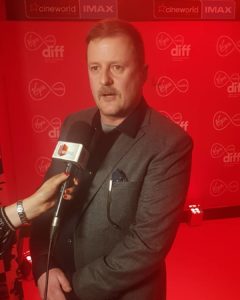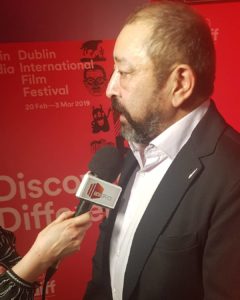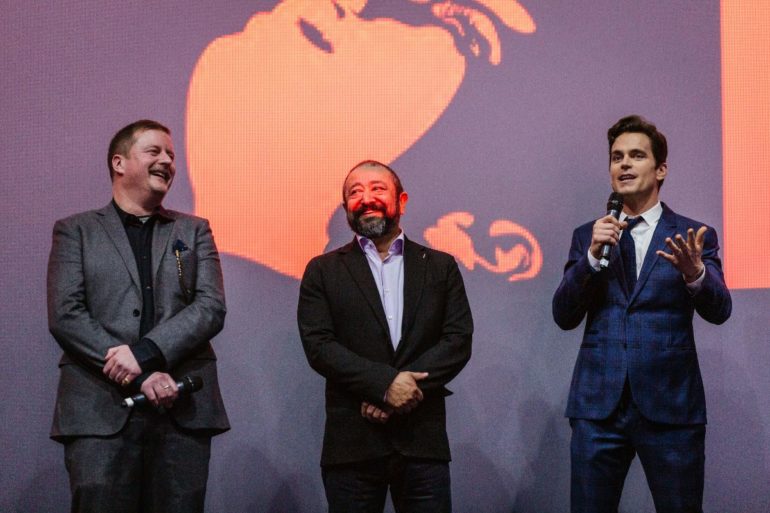Scannain was live on the red carpet for the Irish premiere of John Butler’s Papi Chulo, which opened the 2019 Virgin Media Dublin International Film Festival.
Cast adrift in Los Angeles, Sean (Matt Bomer) — a lonely TV weatherman — drives past a middle-aged Latino migrant worker standing outside Home Depot looking for work. He decides to hire this kind-looking man — to be his friend. Sean is young, gay and white; Ernesto (Alejandro Patiño), portly, straight and married. Despite having nothing in common, they build a sort of friendship based on sign language, until Sean becomes consumed by a deep and obsessional attraction.
Papi Chulo is John Butler’s third feature film, having previously written and directed The Stag and Handsome Devil, both of which closed DIFF in recent years. Rob Walpole and Rebecca O’Flanagan produce for Treasure Entertainment, with financing by Screen Ireland, Head Gear Films, RTE and Windmill Lane. Head Gear Films’ Phil Hunt and Compton Ross are executive producing together with Bankside’s Hilary Davis and Stephen Kelliher.

Scannain: After two films set in Ireland, you’ve moved abroad with this one to film in L.A. What was the drive behind that?
John Butler: It’s the amount of time that I have spent driving around L.A. like an idiot. Lonely, broke, jet-lagged, sunburnt, afraid, and trying to figure out what the hell I was doing. Many filmmakers have spent years and years driving around the city trying to figure it out, shouting at Siri to help them find a parking structure. So it’s based on that feeling of being cast adrift in a large city and trying to find your way home.
And you got great weather, despite filming in January/February.
John Butler: We got the weather. It was warm and cold simultaneously. It was windy, but also incredibly sunny. So we all got windburnt and sunburnt. It was mad for the Irish crew to be flagging off light. It was intensely bright there for 11 hours of the day. Usually, as you know, it’s not like that in Ireland where you are trying to get light into a scene. And over there we didn’t have enough flags. So it was a lot of learning for all of us.
Your three features to date have revolved around male friendship. That is obviously an area you like to explore.
John Butler: I love stories of platonic male friendship. I love buddy movies. American independent cinema has a great history of stories of grown men trying to relate to one another. And I always find them very funny, and under-explored in a way. It’s very rich comedy because men are good friends precisely because they don’t ask each other to talk about their intimate stuff. I like the paradox.
The filmmaking process for you seemed to be a very collaborative experience. You seem to have all become friends as a result of making it.
John Butler: Yeah, that’s incredibly true. And that comes from the top down so credit to Rob [Walpole] and Rebecca [Flanagan], and also to Matt and Alejandro. The atmosphere always had to be loveable and friendly especially if you want people to improvise. I think that as a comedy director the good stuff comes from warmth, from freedom, from getting the sense that you can play around. I never really subscribed to that idea of tension creating genius. Most of the films that I like seem to generate warmth.

Scannain: Since you made the film with John you’ve been over to Ireland on holiday.
Alejandro Patiño: I got an opportunity to see a bit of it. I was here in Dublin for a couple of days and then I was driven over to the west coast, to Galway. The producers and John gave me a voucher to stay at Dromoland Castle. I first called it Dromo-land and then John says no it’s not Disneyland, it’s Dromoland. Listening to his accent for me was great because I love language. And the Irish language is beautiful to me.
You’re the only Angeleno in the film. I believe you helped John with some of the dialogue to make it more local.
Alejandro Patiño: You’re right I was the only Angeleno there. Especially in this industry, in Los Angeles, everybody is from someplace else. And they’ve come to work in Los Angeles because everybody wants to be in Hollywood. And I find myself being the only guy because I’m one of the only Californian-born actors in this film, and in the industry sometimes.
Your background must have helped with the cross-cultural aspect of the film.
Alejandro Patiño: I’m from Compton and I grew up in a house where Spanish was the spoken language. It wasn’t until first grade when I went to school that I started to learn English. The school that I went to was predominantly American-American. So I called myself a Blacxian. So I’d go home to my Spanish influence and I’d go to school and I’d have my African-American friends. So I had that cross-cultural connection from an early age.

Scannain: This film seems to have been one made with a lot of love.
Matt Bomer: I think it all had that great Irish spirit about it. Everyone had some joy in their hearts making the movie. And I think a lot of the Irish crew was very happy to be in a sunny climate in the dead of winter. It was a lovely experience all-round. It was really collaborative and fun, and we rolled up our sleeves and we worked really hard. And then we had some laughs and celebrated at the end of the day.
It has become a very zeitgeisty movie now with the political landscape in the U.S.
Matt Bomer: It has become so yeah. When we first were talking about it, it wasn’t nearly as much of a zeitgeist film. It’s only become more so as time has gone on. We live in a time now when people are trying to put up more walls between each other than ever before, and this is a movie about breaking down those walls. Someone like Ernesto who has the compassion and the kindness to help someone like Sean heal and to be able to hold a space for him and see the worst in him and still come back the next day.

